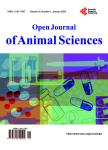Measurement of Metabolic and Inflammatory Serum Markers and Immune Marker Gene Expression during Superovulation in Beef Cattle
Measurement of Metabolic and Inflammatory Serum Markers and Immune Marker Gene Expression during Superovulation in Beef Cattle作者机构:112 Withycombe Hall Department of Animal and Rangeland Sciences Oregon State University Corvallis USA USDA ARS U.S. Meat Animal Research Center Livestock Biosystems Unit Clay Center NE USA Eunice Kennedy Shriver National Institute of Child Health and Human Development Bethesda MD USA
出 版 物:《Open Journal of Animal Sciences》 (动物科学期刊(英文))
年 卷 期:2021年第11卷第2期
页 面:175-196页
主 题:Bovine Metabolism Estrous Cycle Follicle Stimulating Hormone Inflammation
摘 要:Health status of donor cows during superovulation is important to ensure optimal embryo quality at time of collection. Because nutritional and metabolic status impact embryo quality some form of nutritional supplementation is often provided before and during superovulation. OmniGen-AF® (OG) feeding has been shown to assist in the maintenance of animal health through regulation of metabolic status and balance and supporting aspects of immune function. We observed feeding donor cows OG decreased percent degenerate embryos recovered following superovulation increased serum progesterone concentration and improved in vitro embryo development. Evaluation of OG feeding on markers of metabolic function and inflammatory and immune function in beef cattle embryo donors are reported here. Similarly, cow metabolic and inflammatory response with repeated superovulation protocols is not known. Biomarkers to monitor and evaluate cow health during superovulation may provide management options to improve embryo recovery and quality. Twenty-four Angus cross-bred cattle were randomly assigned to four treatment groups, fed 0 or 56 g/hd/day for 49 days and superovulated with 200 or 400 mg Folltropin V (FSH). Blood was collected weekly for analyses. The protocol was repeated on all cows 90-120 d later with cows reassigned to their original groups. No differences (P 0.10) were observed due to OG feeding or FSH dose on metabolic and inflammatory markers. Replicate exerted a significant effect where serum concentration of albumin, IL1β, IL6, PGE2 and leptin were lower (P



